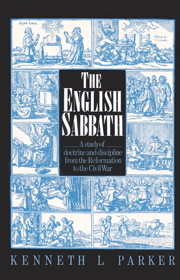Book contents
- Frontmatter
- Contents
- Acknowledgements
- Abbreviations
- 1 The case for a reappraisal
- 2 Medieval sabbatarianism and Reformation reaction
- 3 Early Elizabethan sabbatarianism: 1558–82
- 4 Late Elizabethan and Jacobean sabbatarianism: 1583–1617
- 5 The Book of Sports controversy: 1617–18
- 6 The 1620s: continued consensus
- 7 The sabbatarian controversy
- Epilogue
- Appendix
- Bibliography
- Index
4 - Late Elizabethan and Jacobean sabbatarianism: 1583–1617
Published online by Cambridge University Press: 23 November 2009
- Frontmatter
- Contents
- Acknowledgements
- Abbreviations
- 1 The case for a reappraisal
- 2 Medieval sabbatarianism and Reformation reaction
- 3 Early Elizabethan sabbatarianism: 1558–82
- 4 Late Elizabethan and Jacobean sabbatarianism: 1583–1617
- 5 The Book of Sports controversy: 1617–18
- 6 The 1620s: continued consensus
- 7 The sabbatarian controversy
- Epilogue
- Appendix
- Bibliography
- Index
Summary
The previous chapters have examined Sabbatarian developments in the medieval Church and Reformation period, and established that the scholastic and analogical interpretations were recognized teaching in the early Elizabethan Church. However, we are now faced with the role of this doctrine in the late Elizabethan and early Jacobean period and must confront the claim of many who assert that the doctrine of a morally binding Sabbath was a puritan innovation. Exploring the causes of regicide and puritan radicalism in the seventeenth century, historians have argued that an intense commitment to Sabbatarian principles played an important role. The numerous tracts on the subject in the 1640s and the parliamentary debates in that period emphasize a strength of conviction that had deep roots. Searching for the origins of this commitment, historians have turned to the complaint literature of the 1570s, written by men sympathetic to presbyterian discipline. The debates at the Dedham Classis and the Sabbatarian developments at Cambridge in the 1580s provided further points of reference. The suppression of Nicholas Bownde's Doctrine of the Sabbath in 1599 and the Book of Sports controversies of 1617, 1618, and 1633 seem to confirm the conclusion that Sabbatarianism was indeed a puritan innovation which drove a wedge between precisionists and the established Church. If the case for consensus is to be maintained, these events must be re-examined.
In 1607 Thomas Rogers, a Suffolk minister and chaplain to Archbishop Bancroft, published a revised edition of his Catholic Doctrine of the Church of England, with its often cited preface against presbyterians and Sabbatarians. This preface provided a history of sound doctrine in the English Church and described the threats to orthodoxy during Elizabeth's reign.
- Type
- Chapter
- Information
- The English SabbathA Study of Doctrine and Discipline from the Reformation to the Civil War, pp. 92 - 138Publisher: Cambridge University PressPrint publication year: 1988

